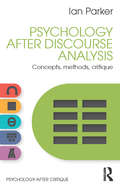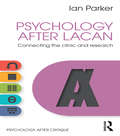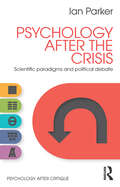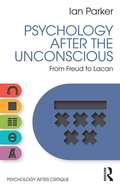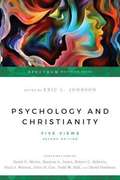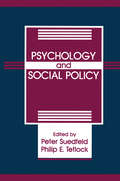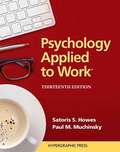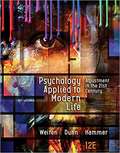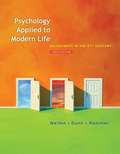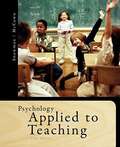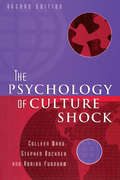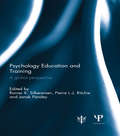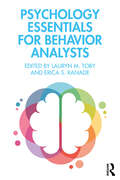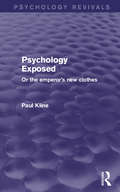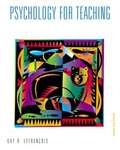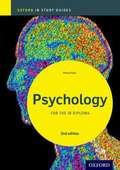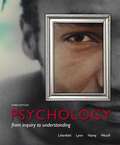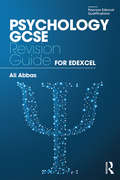- Table View
- List View
Psychology After Discourse Analysis: Concepts, methods, critique (Psychology After Critique)
by Ian ParkerIan Parker has been a leading light in the fields of critical and discursive psychology for over 25 years. The Psychology After Critique series brings together for the first time his most important papers. Each volume in the series has been prepared by Ian Parker and presents a newly written introduction and focused overview of a key topic area. Psychology After Discourse Analysis is the third volume in the series and addresses three central questions: How did discourse analysis develop inside psychology? How does discursive psychology address concerns about the traditional ‘laboratory experiment’ paradigm in psychology? What is the future for discourse analysis? The book provides a clear account of the various forms of discourse analysis that have been used within psychology, and provides a review of their significance for a new generation of psychologists. The early chapters present a framework for understanding the origins of these various forms, as well as the differences between them. Emphasizing the gap between discursive psychology and mainstream psychology, Parker then explores relations between discourse analysis, psychoanalysis, social constructionism and the postmodern turn in the social sciences. The final chapters describe the limitations of discourse analysis and explore its flaws as a framework and as a practice, questioning its future within academia and in political and social contexts beyond psychology. Psychology After Discourse Analysis is essential reading for students and researchers in psychology, sociology, social anthropology and cultural studies, and for discourse analysts of different traditions. It will also introduce key ideas and debates within critical psychology to undergraduates and postgraduate students across the social sciences.
Psychology After Lacan: Connecting the clinic and research (Psychology After Critique)
by Ian ParkerIan Parker has been a leading light in the fields of critical and discursive psychology for over 25 years. The Psychology After Critique series brings together for the first time his most important papers. Each volume in the series has been prepared by Ian Parker and presents a newly written introduction and focused overview of a key topic area. Psychology After Lacan is the sixth volume in the series and addresses three central questions: Why is Lacanian psychoanalysis re-emerging in mainstream contemporary psychology? What is original in this account of the human subject? What implications does Lacanian psychoanalysis have for psychology? This book introduces Lacan’s influential ideas about clinical psychoanalysis and contemporary global culture to a new generation of psychologists. The chapters cover a number of key themes including conceptions of the human subject within psychology, the uses of psychoanalysis in qualitative research, different conceptions of ethics within psychology, and the impact of cyberspace on human subjectivity. The book also explores key debates currently occurring in Lacanian psychoanalysis, with discussion of culture, discourse, identification, sexuality and the challenge to mainstream notions of normality and abnormality. Psychology After Lacan is essential reading for students and researchers in psychology, psycho-social studies, sociology, social anthropology and cultural studies, and to psychoanalysts of different traditions engaged in academic research. It will also introduce key ideas and debates within critical psychology to undergraduates and postgraduate students across the social sciences.
Psychology After Psychoanalysis: Psychosocial studies and beyond (Psychology After Critique)
by Ian ParkerIan Parker has been a leading light in the fields of critical and discursive psychology for over 25 years. The Psychology After Critique series brings together for the first time his most important papers. Each volume in the series has been prepared by Ian Parker and presents a newly written introduction and focused overview of a key topic area. Psychology After Psychoanalysis, the fourth volume in the series, is about the impact of psychoanalysis on critical debates in psychology. It addresses three central questions: Why is psychoanalysis re-emerging within psychology? How can psychoanalytic ideas inform psychosocial research? How does psychoanalysis explain the relation between the individual and society? International in scope, the book includes a clear account of psychoanalysis, and the different varieties of the approach that are at work inside and outside the discipline of psychology. It explores the status of psychoanalysis as a series of concepts and as a methodology, and shows how its clinical practice is crucial to the way that it operates now in an academic context. In doing so, the book sheds light on the arguments currently occurring inside psychoanalysis, with discussion of its relation to critical psychology, psychosocial research, the health professions, culture and social theory. Parker shows how psychoanalysis rests on a notion of ‘method’ that is very different from mainstream psychology, and unravels the implications of this difference. Early chapters examine the lines of debate between various psychoanalytical traditions, and show how critical psychology challenges the assumptions about human nature and subjectivity made in conventional psychoanalysis. Later chapters introduce the methodological device of ‘transference’ and explore how psychoanalysis may be utilized as a resource to review key questions of human culture. Psychology After Psychoanalysis is essential reading for students and researchers in psychology, psychosocial studies, sociology, social anthropology and cultural studies, and to psychoanalysts of different traditions engaged in academic research.
Psychology After the Crisis: Scientific paradigms and political debate (Psychology After Critique)
by Ian ParkerIan Parker has been a leading light in the fields of critical and discursive psychology for over 25 years. The Psychology After Critique series brings together for the first time his most important papers. Each volume in the series has been prepared by Ian Parker, features a newly written introduction and presents a focused overview of a key topic area. Psychology After the Crisis is the first volume in the series and addresses three important questions: What was the crisis in psychology and why does it continue now? How did debates regarding the traditional ‘laboratory experiment’ paradigm in psychology set the scene for discourse analysis? Why are these paradigm debates now crucial for understanding contemporary critical psychology? The first two chapters of the book describe the way critical psychology emerged in Britain during the 1970s, and introduce four key theoretical resources: Marxism, Feminism, Post-Structuralism and Psychoanalysis. The chapters which follow consider in depth the critical role of Marxist thinking as an analytic framework within psychology. Subsequent chapters explore the application and limitations of critical psychology for crucial topics such as psychotherapy, counselling and climate change. A final chapter presents an interview which reviews the main strands within critical psychology, and provides an accessible introduction to the series as a whole. Psychology After the Crisis is essential reading for students and researchers in psychology, sociology, social anthropology and cultural studies, and for discourse analysts of different traditions. It will also introduce key ideas and debates in critical psychology for undergraduates and postgraduate students across the social sciences.
Psychology After the Unconscious: From Freud to Lacan (Psychology After Critique)
by Ian ParkerIan Parker has been a leading light in the fields of critical and discursive psychology for over 25 years. The Psychology After Critique series brings together for the first time his most important papers. Each volume in the series has been prepared by Ian Parker and presents a newly written introduction and focused overview of a key topic area. Psychology After the Unconscious is the fifth volume in the series and addresses three central questions: Why is Freud’s concept of the unconscious important today? Does language itself play a role in the creation of the unconscious? How does Lacan radicalize Freud’s notion of the unconscious in relation to cultural research? The book provides a clear explanation of Freudian and Lacanian accounts of the unconscious. It also highlights their role in offering a new way of describing, understanding and working with the human subject in clinical settings and in cultural research. Part One shows how the unconscious is elaborated in Freud’s early case studies in Studies on Hysteria, while Part Two focuses on Lacan’s re-working of the unconscious and its relationship to language and culture in his influential public seminars. The book also provides access to key debates currently occurring in Freudian and Lacanian psychoanalysis, exploring both the clinical dimension and the consequences for psychological and cultural research. Psychology After the Unconscious is essential reading for students and researchers in psychology, psychosocial studies, sociology, social anthropology and cultural studies, and to psychoanalysts of different traditions engaged in academic research. It will also introduce key ideas and debates within critical psychology to undergraduates and postgraduate students across the social sciences.
Psychology And Christianity: Five Views (Second Edition) (Christian Association For Psychological Studies Books)
by David G. Myers Eric L. Johnson Robert C. Roberts Stanton L. Jones David A. Powlison P. J. Watson John H. Coe Todd W. HallHow are Christians to understand and undertake the discipline of psychology? This question has been of keen interest (and sometimes concern) to Christians because of the importance we place on a correct understanding of human nature. Psychology can sometimes seem disconnected from, if not antithetical to, Christian perspectives on life. How are we to understand our Christian beliefs about persons in relation to secular psychological beliefs? This revised edition of a widely appreciated text now presents five models for understanding the relationship between psychology and Christianity. All the essays and responses have been reworked and updated with some new contributors including the addition of a new perspective, the transformative view from John Coe and Todd Hall (Biola University).
Psychology And Education
by Robert Morris OgdenRoutledge is now re-issuing this prestigious series of 204 volumes originally published between 1910 and 1965. The titles include works by key figures such as C.G. Jung, Sigmund Freud, Jean Piaget, Otto Rank, James Hillman, Erich Fromm, Karen Horney and Susan Isaacs. Each volume is available on its own, as part of a themed mini-set, or as part of a specially-priced 204-volume set.
Psychology And Life
by Richard J. GerrigPsychology and Life, 20th edition provides the perfect balance of science and accessibility so that students can understand research and its application to daily life. Richarg Gerrig combines classic and cutting-edge research studies with an engaging and student friendly writing style.
Psychology And Social Policy
by Philip E. Tetlock Peter SuedfeldThis work explores the application of psychological data and theories to controversial policy issues such as racial and gender inequality, violence and criminal justice. The book also asks whether psychology really has relevant expertise to contribute. First published in 1992. Routledge is an imprint of Taylor & Francis, an informa company.
Psychology Applied To Work
by Paul Muchinsky Satoris HowesThe 12th edition of Psychology Applied to Work presents the story of I/O psychology as told through the most recent research, summarized in a focused and easy-to-comprehend manner. Five special features appearing throughout the book highlight the impact of I/O psychology on key contemporary issues and are designed to enhance student engagement in the field.
Psychology Applied To Work: An Introduction to Industrial and Organizational Psychology
by Paul M. Muchinsky Satoris S. HowesThe 13th edition of Psychology Applied to Work presents the story of industrial-organizational (I-O) psychology as told through the most recent research, summarized in a focused and easy-to-comprehend manner. Each chapter presents four special features highlighting the impact of I-O psychology on key contemporary issues and designed to enhance student engagement in the field.
Psychology Applied to Modern Life: Adjustment in the 21st Century
by Wayne Weiten Dana S. Dunn Elizabeth Yost Hammer Margaret LloydFilled with comprehensive, balanced coverage of classic and contemporary research, relevant examples, and engaging applications, this text shows you how psychology helps you understand yourself and the complex social world around you. It also uses psychological principles to illuminate the variety of opportunities you have in your life and your future career.<P><P> While professors cite this bestselling book for its academic credibility and the authors' ability to stay current with 'hot topics,' students say it's one text they just don't want to stop reading. The text and associated workbook are highly readable, engaging, and visually appealing, providing you with a wealth of material you can put to use every day. Also available: the MindTap online learning experience, featuring an eBook, activities that engage you in thinking about common misconceptions about psychology, animations that introduce key concepts, cool apps (including a text-to-speech reader), and more.
Psychology Applied to Modern Life: Adjustment in the 21st Century (10th Edition)
by Wayne Weiten Dana S. Dunn Elizabeth Yost HammerFilled with comprehensive, balanced coverage of classic and contemporary research, relevant examples, and engaging applications, this book shows you how psychology helps you understand yourself and the world--and uses psychological principles to illuminate the variety of opportunities you have in your life and your future career.
Psychology Applied to Teaching (13th Edition)
by Jack Snowman Rick Mccown Robert BiehlerPsychology Applied to Teaching, 13th Edition combines fresh concepts and contemporary research with long-standing theory and applications to create a book that addresses the needs of today's teachers and students.
Psychology Applied to Work
by Paul M. MuchinskyA textbook on industrial and organizational psychology.
Psychology Contemporary Perspectives
by Paul OkamiResearch-based but highly accessible, this fresh, contemporary, and engaging volume helps students appreciate the science of psychology and understand how its principles apply to their own lives.
Psychology Culture Shock
by Adrian Furnham Colleen Ward Stephen BochnerCrossing cultures can be a stimulating and rewarding adventure. It can also be a stressful and bewildering experience. This thoroughly revised and updated edition of Furnham and Bochner's classic Culture Shock (1986) examines the psychological and social processes involved in intercultural contact, including learning new culture-specific skills, managing stress and coping with an unfamiliar environment, changing cultural identities and enhancing intergroup relations. The book describes the ABCs of intercultural encounters, highlighting Affective, Behavioural and Cognitive components of cross-cultural experience. It incorporates both theoretical and applied perspectives on culture shock and a comprehensive review of empirical research on a variety of cross-cultural travellers, such as tourists, students, business travellers, immigrants and refugees. Minimising the adverse effects of culture shock, facilitating positive psychological outcomes and discussion of selection and training techniques for living and working abroad represent some of the practical issues covered.The Psychology of Culture Shock will prove an essential reference and textbook for courses within psychology, sociology and business training. It will also be a valuable resource for professionals working with culturally diverse populations and acculturating groups such as international students, immigrants or refugees.
Psychology Education and Training: A global perspective
by Rainer K. Silbereisen Janak Pandey Pierre L.-J. RitchieMuch of the psychological research in the last century has been conducted in the global North West; hence, many prevailing theories and methodologies reflect the philosophical framework and shared cultural knowledge of this region. Other world views and cultural contexts have, as yet, not had the same opportunity to develop scientific insights that come to the attention of global audiences. Psychology Education and Training is the first truly international effort to generate a framework for common standards in psychological education and training across the globe. Psychologists have long studied human beings in their socio-cultural context. New challenges such as globalisation and the relationship of the brain and behavior require that education and training keep pace with these rapidly evolving developments. The chapters in this book were generated by an international conference which resulted in the Dornburg Accord. While anchored in higher education, the focus is on the generative and translational psychological science needed to fulfill psychology’s responsibility to society. Psychology Education and Training is the first book of its kind to cover both historic strengths and the requirements of emerging fields. The book deals with balancing the universalities and cultural specificities of psychological processes, the adjustments to academic curricula required to support national needs, as well as the credentials and regulations required to assure the quality of psychological services. Psychology Education and Training is unique in providing initial data and concurrent assessment of various components of education and training in psychology across the globe. The book is a must for faculty members, advanced students of psychology and policy-makers who are interested in the issues that shape their societies.
Psychology Essentials for Behavior Analysts
by Lauryn M. Toby Erica S. RanadePsychology Essentials for Behavior Analysts provides new and developing behavior analysts with important background information from the field of psychology. This information is directly applicable to the field of behavioranalysis and currently lacking in traditional behavior analytic course sequences.This book can be used in training sequences for behavior analysts or for newly credentialed individuals seeking to learn new techniques and perspectives to support their practice. Its broad coverage includes child development, psychotherapeutic techniques, statistics, consultation, cultural responsiveness, trauma-informed care, and the use of standardized assessment measures. It provides readers with essential knowledge of psychological principles that can be applied to behavior analysts, leading to better care for the individuals they serve.Providing much-needed information and training in psychological principles necessary for compassionate behavior analytic care, this is an essential resource for newly credentialed behavior analysts as well as those currently in training. It will also be beneficial to veterans in the field of behavior analysis seeking professional development and continuing education.
Psychology Exposed: Or the Emperor's New Clothes (Psychology Revivals)
by Paul KlineOriginally published in 1988, in this personal review of the state of academic psychology, Paul Kline draws attention to the way in which his peers at the time studiously avoided such threatening matters as human feelings and emotions, unconscious ‘complexes’ – in short anything that could be called the human psyche. His erudite, amusing, and provocative text outlines the crucial influence of the development of scientific method before examining key experiments within cognitive psychology and cognitive science, psychometrics, social psychology, and animal behaviour. Is most of experimental psychology trivial, redundant, and irrelevant? The academic subject cannot continue to ignore its critics, he argued, and must solve its problems by means of radical solutions. Whether they support or refute Professor Kline’s arguments, students and professionals alike will still enjoy this original book.
Psychology For Dummies (For Dummies Ser.)
by Adam CashFind out what makes you—and everyone else—tick Psychology For Dummies takes you on the challenging and thrilling adventure into the astonishing science of why we do the things we do. Along the way you’ll find out how psychology helps us improve our relationships, make better decisions, be more effective in our careers, and avoid stress and mental illness in difficult times. In a friendly, jargon-free style, clinical psychologist and teacher Adam Cash uses practical examples to delve deep into the maze of the human mind: from the basic hardware, software, and "wetware" of our brains to the mysteries of consciousness and the murkier reaches of abnormal behavior. He also provides profound insights into our wants and needs, the differences between psychological approaches, and how positive psychology can help you lead the “good life” that fulfills you most. Gain insights into identity and the self Cope with stress and illness Maintain psychological health Make informed choices when seeking counseling Whether you’re new to the unconscious or an established devotee of Freud and pharmacology, Psychology For Dummies is your essential guide to the examined life—and what can make it even more worth living!
Psychology For Teaching
by Guy R. LefrancoisIn this engaging and comprehensive text, Lefrancois explains, applies, illustrates, and investigates psychological principles and classroom practices in a way that is concise and informative as well as encouraging and entertaining. Based on the most recent research in human development as it relates to learning, teaching, and thinking, this book presents a well-rounded, thorough, and relevant discussion of psychological principles.
Psychology For The Ib Diploma
by Jette Hannibal Alexey PopovComprehensively updated to match the new DP Psychology syllabus, for first teaching September 2017, the second edition of this assessment-focused study tool presents all the key concepts covered at Standard and Higher Level, building learners' confidence and promoting long-term achievement in examinations. Key concepts are broken down into manageable segments as part of a concise, accessible format, reinforcing understanding and facilitating effective revision. Rigorous extension material provides opportunities for learners to be stretched, whilst clear, straightforward language and visual aids support EAL learners.
Psychology From Inquiry to Understanding, Third Edition
by Scott O. Lilienfeld Nancy J. Woolf Laura L. Namy Steven Jay LynnProvides students with the tools they need to go from inquiry to understanding.<P> Psychology: From Inquiry to Understanding, 3/e provides the framework students need to go from inquiry to understanding by continuously modeling the application of the six key principles of scientific thinking. The text teaches students how to test their assumptions, and motivates them to use scientific thinking skills to better understand the field of psychology and the world around them.<P> MyPsychLab is an integral part of the Lilienfeld / Lynn / Namy / Woolf program. Key learning applications include writing assessment, MyPsychLab video series, and simulations.<P> This text is available in a variety of formats – digital and print. Pearson offers its titles on the devices students love through Pearson’s MyLab products, CourseSmart, Amazon, and more.<P> Teaching & Learning Experience<P> This program will provide a better teaching and learning experience -- for you and your students. Here's how:<P> * Personalize Learning – MyPsychLab is an online homework, tutorial, and assessment program. It helps students prepare for class and instructor gauge individual and class performance.<P> * Improve Critical Thinking – Numbered learning objectives and section summaries help readers build critical thinking and study skills.<P> * Engage Students – Visual activities, such as labeling of figures and completion of summary tables, help students review key concepts.<P> * Explore Research – “Apply Your Scientific Thinking Skills” questions are tied to outside research assignments.<P> * Support Instructors – Support Instructors—A full set of supplements, including MyPsychLab, provides instructors with all the resources and support they need.<P>
Psychology GCSE Revision Guide for Edexcel
by Ali AbbasIf you’re studying for a GCSE in Psychology you’ll need a revision guide that tells you everything you need to know. This accessible and interactive book covers all compulsory and all optional topics on the GCSE Edexcel Psychology syllabus introduced in 2017, including development, memory, psychological problems, brain and neuropsychology, social influence and research methods. It summarises the specification material clearly and attractively, enabling you to easily digest and retain the information ready for your exams. Packed full of revision ideas and techniques designed to help you cement your knowledge, the book includes a number of unique and helpful features, such as: Expert tips from an experienced senior examiner to clarify key points and help you avoid making common errors Sample exam questions to aid practice Active learning tasks, such as key definitions and word gaps Double page spreads outlining the studies you need to know, and their strengths and weaknesses Coverage of the new compulsory mathematical element which was brought into the specification in 2017 Perfect for revising psychological concepts, theories and studies in relation to the three critical assessment objectives, Psychology GCSE Revision Guide for Edexcel is an essential resource for anyone taking a psychology GCSE using the Edexcel specification.
